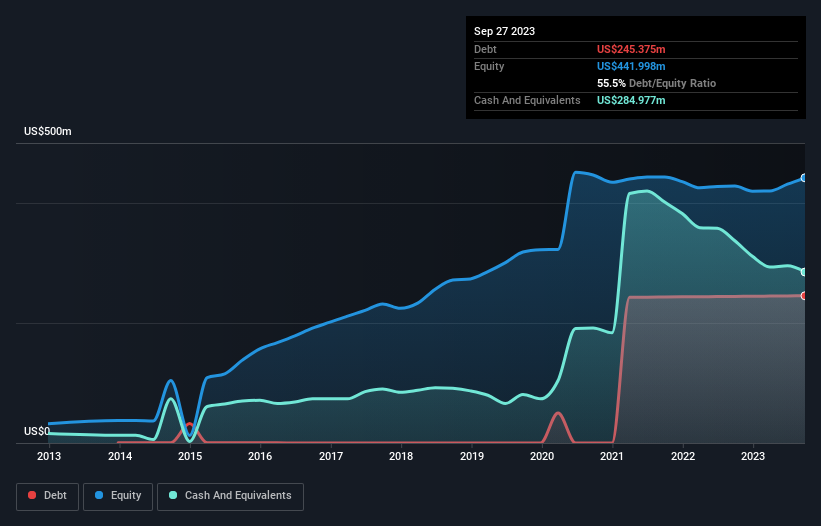Legendary fund manager Li Lu (who Charlie Munger backed) once said, 'The biggest investment risk is not the volatility of prices, but whether you will suffer a permanent loss of capital.' So it seems the smart money knows that debt - which is usually involved in bankruptcies - is a very important factor, when you assess how risky a company is. Importantly, Shake Shack Inc. (NYSE:SHAK) does carry debt. But is this debt a concern to shareholders?
When Is Debt A Problem?
Debt assists a business until the business has trouble paying it off, either with new capital or with free cash flow. If things get really bad, the lenders can take control of the business. However, a more usual (but still expensive) situation is where a company must dilute shareholders at a cheap share price simply to get debt under control. Of course, the upside of debt is that it often represents cheap capital, especially when it replaces dilution in a company with the ability to reinvest at high rates of return. The first step when considering a company's debt levels is to consider its cash and debt together.
Check out our latest analysis for Shake Shack
How Much Debt Does Shake Shack Carry?
The chart below, which you can click on for greater detail, shows that Shake Shack had US$245.4m in debt in September 2023; about the same as the year before. However, it does have US$285.0m in cash offsetting this, leading to net cash of US$39.6m.

How Strong Is Shake Shack's Balance Sheet?
The latest balance sheet data shows that Shake Shack had liabilities of US$152.2m due within a year, and liabilities of US$970.7m falling due after that. Offsetting these obligations, it had cash of US$285.0m as well as receivables valued at US$26.0m due within 12 months. So its liabilities total US$811.9m more than the combination of its cash and short-term receivables.
While this might seem like a lot, it is not so bad since Shake Shack has a market capitalization of US$2.93b, and so it could probably strengthen its balance sheet by raising capital if it needed to. But it's clear that we should definitely closely examine whether it can manage its debt without dilution. Despite its noteworthy liabilities, Shake Shack boasts net cash, so it's fair to say it does not have a heavy debt load!
Although Shake Shack made a loss at the EBIT level, last year, it was also good to see that it generated US$3.7m in EBIT over the last twelve months. The balance sheet is clearly the area to focus on when you are analysing debt. But it is future earnings, more than anything, that will determine Shake Shack's ability to maintain a healthy balance sheet going forward. So if you want to see what the professionals think, you might find this free report on analyst profit forecasts to be interesting.
Finally, while the tax-man may adore accounting profits, lenders only accept cold hard cash. While Shake Shack has net cash on its balance sheet, it's still worth taking a look at its ability to convert earnings before interest and tax (EBIT) to free cash flow, to help us understand how quickly it is building (or eroding) that cash balance. Over the last year, Shake Shack saw substantial negative free cash flow, in total. While investors are no doubt expecting a reversal of that situation in due course, it clearly does mean its use of debt is more risky.
Summing Up
While Shake Shack does have more liabilities than liquid assets, it also has net cash of US$39.6m. So we are not troubled with Shake Shack's debt use. Above most other metrics, we think its important to track how fast earnings per share is growing, if at all. If you've also come to that realization, you're in luck, because today you can view this interactive graph of Shake Shack's earnings per share history for free.
If you're interested in investing in businesses that can grow profits without the burden of debt, then check out this free list of growing businesses that have net cash on the balance sheet.
New: Manage All Your Stock Portfolios in One Place
We've created the ultimate portfolio companion for stock investors, and it's free.
• Connect an unlimited number of Portfolios and see your total in one currency
• Be alerted to new Warning Signs or Risks via email or mobile
• Track the Fair Value of your stocks
Have feedback on this article? Concerned about the content? Get in touch with us directly. Alternatively, email editorial-team (at) simplywallst.com.
This article by Simply Wall St is general in nature. We provide commentary based on historical data and analyst forecasts only using an unbiased methodology and our articles are not intended to be financial advice. It does not constitute a recommendation to buy or sell any stock, and does not take account of your objectives, or your financial situation. We aim to bring you long-term focused analysis driven by fundamental data. Note that our analysis may not factor in the latest price-sensitive company announcements or qualitative material. Simply Wall St has no position in any stocks mentioned.
About NYSE:SHAK
Shake Shack
Owns, operates, and licenses Shake Shack restaurants (Shacks) in the United States and internationally.
Solid track record with reasonable growth potential.
Market Insights
Community Narratives



